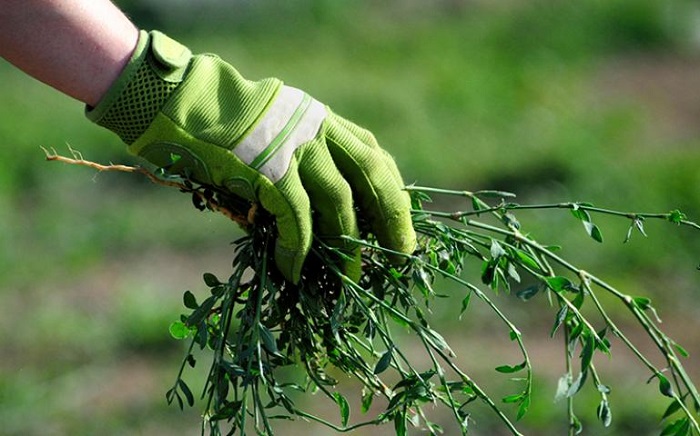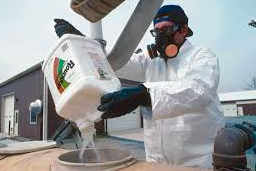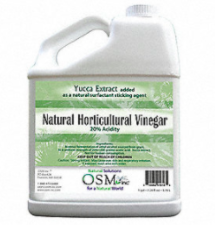
After learning about its devastating consequences of using Glyphosate herbicides like Roundup, I stopped using it years ago and started looking for something speedier and less unsightly than black plastic sheeting.
Is There a Safe Alternative to Roundup???
Even as more people continue to learn about the dangers of Roundup the herbicide remains in heavy use in the US and around the world. Many people are still unacquainted with the serious health issues posed by glyphosate, the key ingredient in Roundup which was developed by Monsanto and is now owned by Bayer. Glyphosate was classified as a probable human carcinogen by the World Health Organization (WHO) in March 2015.
The rise in sustainable, organic farming, coupled with the reported health risks associated with glyphosate exposure has prompted farmers, groundskeepers and gardeners to ask:
Is there a safe alternative to Glyphosates like Roundup?
The answer is yes, and employing an alternative to Glyphosates like Roundup in gardening or agriculture is more important than ever.
Why You Should Use an Alternative to Glyphosates like Roundup:
Glyphosate is so widely used in the U.S. and around the world that traces of the chemical have been found in breast milk, cotton products, beer, wine (even when made with organic grapes), eggs, oatmeal and non-dairy coffee creamer, among other products. According to Beyond Pesticides, between 180 and 185 million pounds of Roundup products are applied and sprayed every year in the United States, making it the most commonly used agriculture chemical in the country.
 The herbicide has also given rise to GMO’s (Genetically Modified Food), which has been linked to health issues such as infertility, immune problems, faulty insulin regulation, accelerated aging and changes in major organs and the gastrointestinal system.
The herbicide has also given rise to GMO’s (Genetically Modified Food), which has been linked to health issues such as infertility, immune problems, faulty insulin regulation, accelerated aging and changes in major organs and the gastrointestinal system.
If the health risks are not enough to convince you to consider an alternative to Roundup, maybe the environmental impact will change your mind…
A recent US Geological Survey study sampled waterways in 38 states and found glyphosate in the majority of rivers, streams, ditches and wastewater treatment plants that were tested. Glyphosate also was found in roughly 70 percent of rainfall samples.
Breaking News: In August of 2018, school pesticide applicator Dwayne “Lee” Johnson, who is dying of Non-Hodgkin’s Lymphoma, was awarded 289.2 million dollars from Monsanto by a California Supreme Court jury. Monsanto was found guilty of acting with “malice and oppression,” meaning they knew their glyphosate products could cause cancer and the company executives suppressed the information. As of September 2018, over 8,000 more Roundup users are filing lawsuits against Monsanto.

Types of Alternatives to Glyphosate like Roundup:
Most of the other alternative herbicides used by farmers or gardeners fall into the following categories:
- Herbicidal Soaps
- Iron-Based Herbicides
- Salt-Based Herbicides
- Phytotoxic Oils (Essential oils such as clove, peppermint, pine or citronella.)
- Corn Gluten
A number of different alternative herbicides use a combination of these approaches to great effect. In this article, we are going to discuss the acetic acid (vinegar) approach.
Using an Alternative to Roundup:
In order to get the best results from a Roundup alternative, it is best to use in conjunction with other helpful practices, like working to improve soil health, plant nutrition and irrigation. Remember, an alternative to Roundup is generally going to be a contact herbicide (except for electric shock), not a systemic herbicide, such as Roundup which kills the entire plant by entering the vascular system.
Contact herbicides generally work by burning plant foliage that comes into contact with the product. They are only capable of killing weeds that have emerged—they have no residual activity on weeds that emerge after application.
Using White Vinegar:
Vinegar is a versatile substance and can be used to replace many commercial home and garden chemicals – glyphosate being one of them. Vinegar is a safer and cheaper alternative to these harmful chemicals, not to mention better for the environment.
To help get rid of notorious weeds, I’d confidently recommend 30% Vinegar Concentrate which is effective, yet non-toxic.
In a pump sprayer you should dilute it to about 15% before using it to target the unwanted weeds.
Spray some vinegar on the affected areas of your garden and you will be happy to see the weeds are dead in just a couple of days later.
Their roots can wither even if you use pickling liquid, but if you are determined to kill naturally the strong and long taproots of the invaders, vinegar is the perfect solution.
Make sure to use on a wind free day and you’re set!!!
What You’ll Need for Alternative Herbicide:
Acetic Acid – Commonly known as vinegar, acetic acid affects the cell membranes of a plant and causes rapid breakdown of foliage tissue on contact. Vinegar used for herbicidal purposes can be organic household vinegar, which is roughly five percent acetic acid or agricultural vinegar, which has an acetic acid concentration of roughly 20 percent. In sufficient quantities, agricultural vinegar by itself will quickly burn down a weed. 
There is much debate on the efficacy of household vinegar versus agricultural vinegar in alternative herbicides. Research has found that acetic acid concentrations between 5 and 10 percent can provide viable control of very small, young weeds that have one or two leaves (or are within two weeks of germination). Larger weeds with three or four leaves more are likely to survive this concentration. Using higher agricultural vinegar with higher concentration of acetic acid and increasing the application volume can improve weed control.
Salt – Some choose to combine vinegar with salt to make their Roundup alternative more potent. Like vinegar, salt is a desiccant, so it dries out leaves and stems. Combining salt with vinegar will make your alternative to Roundup “extra strength.”
Oil or Soap – Oil will break down any coating or other natural barriers that many weeds produce to protect their leaves. By using oil or soap in your mixture, you give the vinegar and salt a greater chance to penetrate the weed. Additionally, oils and soaps break the tension water on weed surfaces, which keeps the mixture from running off.
Tips for Application of Your Alternative to Roundup:
- Alternative herbicides work best when applied on a hot day. If possible, wait until humidity is low and morning dew has burned off. This will allow the mixture to stay in contact with weeds.
- Be careful not to spray the mixture on plants you do not wish to kill. You can do damage to the plants you are trying to protect if you aren’t careful.
- Use gloves and protective eye-wear, as the mixture can damage your skin, especially if you are using agricultural vinegar with higher concentration of acetic acid.
- Larger weeds and perennial weeds may wilt or discolor after application, but in some cases, they will regrow a few days or weeks later. These weeds will require multiple applications to be controlled.
Are Alternative Herbicides Effective:
A University of Maryland study found that properly applied acetic acid-based alternative herbicides have promising results controlling the following weeds:
|
|
The Benefits of Using Alternatives to Roundup:
- Public health safety
- Avoidance of lawsuits
- Improved soil and water retention
- Improved water quality
- Improved longevity of landscaping

The EPA declared glyphosate safe in 1991. But in March, the International Agency for Research on Cancer, an arm of the World Health Organization, classified glyphosate as a “probable” cause of cancer.
This really answered my problem, thank you!
I believe you have observed some very interesting details. I really appreciate this post.
Thanks for your kind words…Jerry
Wow! Thank you! I have constantly wanted to post something like this on my website. Can I include a portion of your post to my blog?
Burton – I see no problem with that and thanks for asking. A link to our website would be great…Thanks, Jerry
Hi my friend! I want to say that this article is awesome, great written and comes with all the significant information. I’d like to see extra posts like this.
Really great information, thanks for the share and insights! I will recommend this to my friends for sure.
Great info, thanks for the share!
Hello there! Would you mind if I share your blog with my myspace group? There’s a lot of people that I think would really enjoy your content. Please let me know. Cheers
Tristan – Thanks for asking and I have no problems with you sharing this blog…
There are some interesting points in this article. Good article, thanks and we want more!
It is a perfect time to make some plans for the future and it is time to be happy. I have read this post and if I could I desire to suggest you few interesting things or suggestions. Maybe you can write next articles referring to this article. I wish to read more things about it!
It is actually a great and helpful piece of info. I am very satisfied that you have shared this useful info with us. Please keep us up to date on this subject. Thank you for sharing.
I got this website from my friend who informed me about this web page. This is a very informative posts.
True story’s are the best one!!!
Like!! Thank you for publishing, this is an awesome article.
Merely a smiling visitant here to share the love (:, btw great design and style.
Good post and very impressed with your website. I had no trouble navigating through all tabs and related info and being truly easy to access. I found what I was looking for. Excellent task..
Hey, I have miss your super writings, so came back for more…
I truly enjoy this website, it was a fantastic posts.
Fantastic post, very informative. You must continue your writing. I’m sure, you have a huge readers’ base already!
Thanks so much for giving everyone an extraordinarily superb article.
Awesome design. I give you an A+ for effort and hard work. Your writing is engaging. Thanks
Very good post, thanks for sharing.
Thank for posting this great blog…
Very good article. Really Cool
Thank you for the information. We got a book from our local library but I think I learned more clear from this post. I am very glad to see such great information being shared freely out there.
I really like your blog…very nice colors & theme. Did you make this website yourself or did you hire someone to do it for you? Plz answer back as I’m looking to create my own blog and would like to know where u got this from. thanks
I was lead to this web site by my cousin. Incredible! Thanks!
I is genuinely a very nice internet site and article. I like it!!!
Thanx for the effort, keep up the good work Great work, I am going to start a small Blog Engine course work using your site I hope you enjoy blogging with the popular BlogEngine.net.The thoughts you express are really awesome. Hope you will right some more posts.